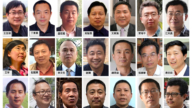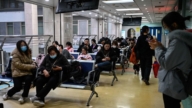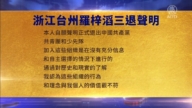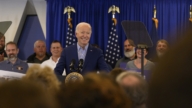【新唐人2013年04月18日讯】大陆新闻出版广电总局近日宣布加强媒体管理,包括新闻单位不得擅自使用境外媒体资讯、新闻编采人员设立职务微博要报备批准等。消息一出,网友惊呼“习李蜜月期要结束了”、“微博反腐的大门要关了”。大陆媒体人士分析,这是中共党内派系斗争的表现,还有观点指出,中共的新闻审查从未放松过。
大陆新闻出版广电总局近日下发了《关于加强新闻采编人员网路活动管理的通知》。《通知》要求,各类新闻单位未经批准不得擅自使用境外媒体的讯息;加强审核新闻网站内容及管理新闻编采人员网路活动;禁止承包、出租或转让网路新闻编采业务;无新闻记者证不得以网站名义采访或发稿。此外,新闻单位设立官方微博、新闻编采人员设立职务微博均须主管单位批准。
长城抗战网主编贾元良表示,这个《通知》的下达是一个不太好的现象,这预示着又要对新闻进行管控了。但是他觉得,这种做法不符合目前形势的发展。
长城抗战网主编贾元良:“现在本身已经是互联网时代了。公众对一个事件有知情权,媒体有它的报导权。这是一个双向的,这是一个互动的。国内的这种新闻报导或者公众知情权是任何人都封杀不了的,除非把互联网断掉,那这样的话我认为可能会引起更大方面的反弹,也会引起公众对新闻知情权的强烈不满。”
《法国国际广播电台》报导,此前不久,中共陕西省委宣传部常务副部长任贤良在《红旗文稿》上刊文,呼吁严管网路自媒体,将“党管媒体”与“党管军队”相提并论,列为维持中共通知的“原则底线”,引起民间广泛议论。
新闻出版总署的这份《通知》,事实上很大程度上将任贤良对网路,尤其是对社交媒体微博的管制的建议付诸实施。
还有网友评论说,这可能预示着习李新领导人的蜜月期结束,今后言论要收紧了。贾元良则认为,这个动作可能反映出中共高层的权力斗争。
贾元良:“我认为出台这样一个通知,可能还是体现了体制内内部斗争的一个倾向。历来中共体制内对舆论宣传存在着一个是开放,另一方面存在要管控要收紧这样的针锋相对的争斗。现在发出这样一个通知,可能管控派又暂时占了上风。”
原《人民日报》记者,现任中国洞察事务监督网主编光远则认为,这是当局一贯的做法,中共实际上从1949年到现在,对新闻的审查制度一直没放松过。
中国洞察事务监督网主编光远:“两个方面。第一个,它(中共)实际上对境外的一些媒体,它管控,管控不了了。因为他(民众)通过互联网可以看到很多的消息。第二个,它要管控自己的纸面媒体,自己的网站,要一定听从命令听指挥,按照它的统一部署来做。它总的就是说,你们不要相信国外的东西,要听政府传达的东西。”
此前,《人民日报》4月14号在一版刊发报导《新闻人要做共圆中国梦的建设者》,被认为是为新一波的舆论管制防风造势。文章指责市场化媒体[对正面报导和成就宣传漫不经心、三言两语带过,对负面新闻、八卦消息却一拥而上”。
《法广》评论说,一场对所谓“短平快”揭丑曝光和“愤青式”新闻评论路线的市场化媒体的围剿运动正在部署中,而对媒体人的网路言论,尤其是微博言论的管制,可能正是重中之重。
采访编辑/秦雪
China’s New Media Supervision Regulation
Recently, China’s media regulator announced
that it will strengthen the supervision on media.
It said that media work units aren’t allowed to quote
foreign media coverage without authorization.
If an editor wants to open a microblog for work,
he will need to have an official approval.
Netizens responded quickly,’Xi-Li’s ‘honey moon’is over,’
‘the microblogging’ anti-corruption door is closing,’ etc.
Experts think this indicates that struggle within
the Chinese Communist Party (CCP) is intensifying.
Some remarked that CCP’s censorship
had actually never eased up.
China’s General Administration of Press, Publication,
Radio, Film and Television had issued a new regulation.
It is called, “Notice regarding supervision
of news editors’ reporting on foreign media coverage."
The Notice says, “The media work units
can’t use unauthorized foreign news products;
the censorship on news websites and supervision
of editors’website news reports must be strengthened;
interviewing or publishing reports
without media accreditation is not allowed."
In addition, media’s official microblogs and news editors
personal blogs should be verified by their company.
Gu Yuanliang, editor-in-chief of a website,
said the Notice isn’t a good sign.
It attempts to control press content further. Gu believes
this move would be difficult to realize at the current situation.
Gu Yuanliang: “We live in a social network’era. The public
has the right to know the truth, and the media to report it.
This is a two-way approach,
a form of interaction.
No one can block news reporting,
or freedom of information in the Mainland.
The only way to stop these is to cut off the Internet;
but I think people will be greatly against it.
The public will be furious
if they lose their right to information."
Radio France Internationale (RFI) reported that not long ago,
Ren Xianliang, a propaganda official, published an article in the Red Flag magazine.
He urged for a stricter control of the Internet media,
and that the Party should control the media and military.
His words triggered public’s controversy.
The Notice actually puts Ren’s suggestion into effect,
particularly in regards to the microblogs’control.
Netizens said, this indicates that the new Xi-Li’ ‘honey-moon’
is over, and that the freedom of expression will be tightened.
Gu Yuanliang believes, this move may reflect that power
struggling among CCP’s top-level is intensifying.
Gu Yuanliang: “I think issuing this Notice reflects
the situation of struggling within the CCP system.
In the history, the CCP system had always two opposing
opinions on publications: for openness and for tight control.
Now they issued such a Notice, maybe meaning
the faction that insists on control had won."
Guang Yuan, a former People’s Daily reporter,
believes this is Chinese regime’s common practice.
Actually, since 1949, the CCP has never eased
on its news censorship.
Guang Yuan: “There are two aspects: firstly, the CCP can’t
control foreign media even if they want to, as netizens can read a lot of information via the Internet.
Secondly, the CCP wants to control state-owned newspapers
and websites, their media must obey CCP and do what it tells.
Generally, the CCP wants the public to listen
to the government and not the foreign coverage."
Prior to this, on April 14, People’s Daily
published an article in a full page.
It said,"Journalists should be builders
in achieving China’s Dream."
It was considered a propaganda effort
to prepare a new censorship move.
The article also blames that media
has become too market-oriented.
It said, “Positive issues and achievements
are reported casually and with a few words;
whereas the negative and gossip’news
everyone is rushing to cover."
RFI said, the so-called “short-term" exposing corruption
and market-oriented online news are facing attacks.
For news editors, their online posts, particularly
on microblogs, are the top priority for control.


























